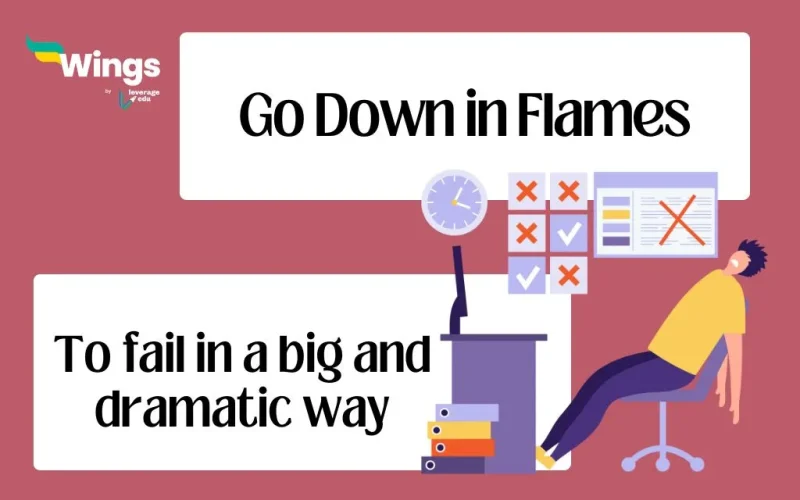Go down in flames meaning: The idiom “go down in flames” is often used to describe a situation or endeavor that fails dramatically or disastrously. It signifies a complete and utter failure, often accompanied by chaos or destruction.
When someone or something goes down in flames, it means they experience a spectacular downfall or defeat.
This idiom can be applied to various contexts, ranging from personal relationships to professional ventures. It conveys the idea of a catastrophic outcome, where all efforts or hopes end in failure.
This Blog Includes:
Also Read: Useful Idioms with Examples, Sentences and Meanings
Usage with Examples
Here are some examples showcasing the usage of the idiom “go down in flames”:
1. The team’s ambitious project went down in flames when they couldn’t secure the necessary funding.
2. Despite their best efforts, the company’s marketing campaign went down in flames, resulting in a significant loss of customers.
3. The politician’s scandalous revelations caused his career to go down in flames, leading to public humiliation and resignation.
4. The entrepreneur’s promising startup went down in flames due to mismanagement and lack of market demand.
Also Read: Idioms for IELTS
Synonyms and Similar Expressions
Here are some synonyms and related expressions that convey a similar meaning to “go down in flames”:
1. Crumble
2. Collapse
3. Fail spectacularly
4. Meet with disaster
5. Bite the dust
6. Go up in smoke
Go Down in Flames Meaning Quiz
Here are 10 multiple-choice questions (MCQs) to test your understanding of the idiom “Go Down in Flames.”
1. What does “go down in flames” mean?
a) To succeed brilliantly
b) To fail completely in a dramatic way
c) To improve steadily
d) To win against all odds
Answer: b) To fail completely in a dramatic way
2. Which of the following best represents “going down in flames”?
a) A company making record profits
b) A pilot safely landing a plane
c) A team losing a match after leading by 3 goals
d) A student scoring full marks in an exam
Answer: c) A team losing a match after leading by 3 goals
3. Which situation is an example of “going down in flames”?
a) A restaurant closing due to bad management and debt
b) A new movie becoming a blockbuster hit
c) A scientist winning a Nobel Prize
d) A car running smoothly on a long journey
Answer: a) A restaurant closing due to bad management and debt
4. If someone’s plan “goes down in flames,” what happens?
a) It becomes successful
b) It fails completely
c) It improves over time
d) It is postponed
Answer: b) It fails completely
5. Which of the following is a synonym for “go down in flames”?
a) Rise from the ashes
b) Crash and burn
c) Shine brightly
d) Keep afloat
Answer: b) Crash and burn
6. In which of these sentences is “go down in flames” used correctly?
a) “Despite their efforts, the startup went down in flames due to financial issues.”
b) “She went down in flames when she won the award.”
c) “His project went down in flames because he worked so hard on it.”
d) “The athlete went down in flames after setting a new world record.”
Answer: a) “Despite their efforts, the startup went down in flames due to financial issues.”
7. What could cause a business to “go down in flames”?
a) Poor management and financial losses
b) Launching a successful new product
c) Expanding to new international markets
d) Hiring a talented CEO
Answer: a) Poor management and financial losses
8. Which famous historical event could be described as “going down in flames”?
a) The sinking of the Titanic
b) The moon landing
c) The invention of the telephone
d) The signing of the Declaration of Independence
Answer: a) The sinking of the Titanic
9. If a politician’s career “goes down in flames,” what likely happened?
a) They won an important election
b) They got promoted to a higher position
c) They lost due to a major scandal
d) They successfully passed a new law
Answer: c) They lost due to a major scandal
10. Which of these phrases is the opposite of “go down in flames”?
a) Fail miserably
b) Rise to success
c) Burn out
d) Fall apart
Answer: b) Rise to success
Check out blogs on idioms here:
FAQs
No, most idioms do not have direct translations because their meanings are figurative. Instead, different languages have their own idioms with similar meanings.
“Go down in flames” means to fail completely and dramatically, often in a very noticeable or disastrous way.
Yes, it always refers to failure, but sometimes it can imply that someone failed while trying hard or taking a big risk.
This was all about the idiom get your act together meaning and examples. Hope you understood the concept where it’s used. For more blogs on Learn English, follow Leverage Edu.


 One app for all your study abroad needs
One app for all your study abroad needs












 60,000+ students trusted us with their dreams. Take the first step today!
60,000+ students trusted us with their dreams. Take the first step today!